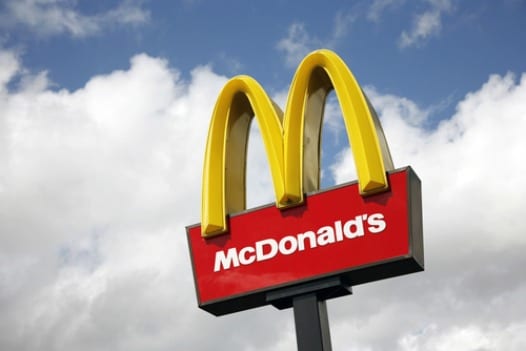Fast-Food Workers in NYC Go On Strike: I’m Lovin’ It
“You deserve a break today, So get out and get away … to McDonald’s!”
Last week, 200 New York City fast food workers took a break and got away from McDonald’s and several other fast-food chains in the Big Apple. In the first-of-its-kind labor action, workers demanded higher wages and recognition of a new union called the Fast Food Workers Committee.
Inspired by the Black Friday walkout by Walmart workers across the country, the action, called Fast Food Forward, was also the culmination of months of organizing by New York Communities for Change (NYCC), a group that has helped unionize low-wage car wash and grocery workers in New York, and the 2.1 million-member Service Employees International Union (SEIU), which hired 40 full-time organizers to spearhead the campaign.
“What you want is what you get!”
The fast-food industry has always been difficult to unionize. In the recent past, fast-food chains like McDonald’s, Burger King, Domino’s, KFC, Taco Bell, Wendy’s and Papa John’s were largely staffed by teenagers working part-time and college kids who needed a little extra money — a workforce that could hardly be counted upon to pay union dues or care about the long term.
In addition, turnover has always been high in the industry, and many individual stores are franchises that are forced to take their orders from national headquarters that promulgate and enforce company rules. Individual franchisees also traditionally have feared paying wages that would put them at an economic disadvantage against any nearby fast-food outlets.
But today, thanks in part to the Great Recession, more and more fast-food workers are middle-aged and older, are more highly educated (in major U.S. cities, 9 percent have been to college), and have held jobs in unionized companies or union-protected industries, and thus are more familiar with how unions work and why they are important to their financial well-being.
“We do it all for you!”
And the number of fast-food workers is growing – industry employment has mushroomed 55 percent since 2000. In 2011, the country had 2,799,430 combined food preparation and serving workers, including workers in fast-food restaurants. New York City alone has some 50,000 fast-food workers, making a median hourly wage of $8.90 — less than half of what an adult with one child living in the least expensive area of the city needs to be self-sufficient.
In fact, according to the Bureau of Labor Statistics, fast-food employees are among the lowest-paid workers in America, earning an average salary of $18,130 a year — just about the federal poverty line for a family of three. The average New York worker earns about $11,000 annually. That means that the vast number of these individuals are eligible for federal benefits like food stamps and Medicaid, essentially making taxpayers foot the bill for what their employers should be paying for.
“Nobody can do it like McDonald’s can!”
And even though industry executives claim that agreeing to worker demands for health benefits and a raise to $15 an hour would be unfeasible — “there goes the Dollar Menu” — the $200 billion-a-year industry is doing well. Fast-food company CEOs made a combined $1.5 billion last year, and McDonald’s corporate profit was $5.5 billion. Over the past four years, the hamburger chain’s returns have increased 130 percent.
“I’m lovin’ it!”
Will the nascent organizing efforts grow with time and exposure? It may be too early to tell. According to strike organizers, employer retaliation in the form of suspensions and dismissals has already occurred, and the strikers also know that things will not change overnight. (Fast Food Forward is hosting a march of the city’s low-wage workers on Thursday at Herald Square, starting at 4:30 p.m.)
The next time you go to your neighborhood fast-food joint for a meal out, you may want to reflect on what may be the newest ingredient in your Big Mac — it’s called courage.
Take a bite and see if you can taste it.
Photo: Bikeworldtravel / Shutterstock.com


















